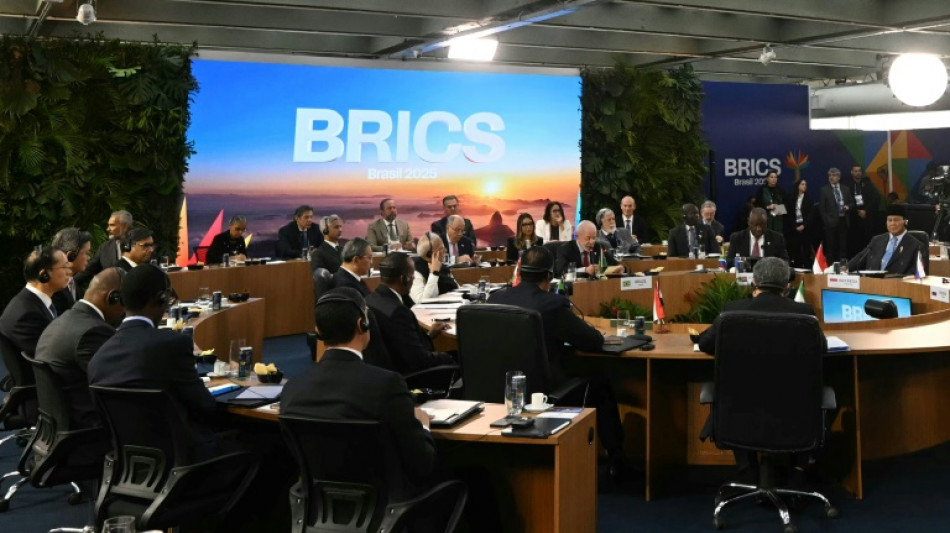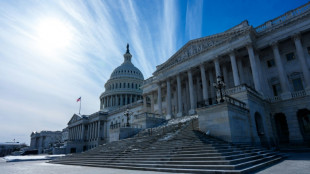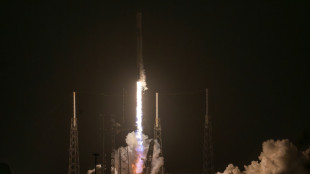

BRICS meeting in Rio hits out at Trump tariffs
BRICS leaders descended on sunny Rio de Janeiro Sunday, issuing a dark warning that US President Donald Trump's "indiscriminate" import tariffs risk hurting the global economy.
The 11 emerging nations -- including Brazil, Russia, India, China and South Africa -- represent about half the world's population and 40 percent of global economic output.
The bloc is divided about much, but found common cause when it comes to the mercurial US leader and his stop-start tariff wars.
The BRICS leaders voiced "serious concerns about the rise of unilateral tariff and non-tariff measures," warning they are illegal and arbitrary, according to a final summit statement.
In April, Trump threatened allies and rivals alike with a slew of punitive duties, but abruptly offered a reprieve in the face of a fierce market sell-off.
Trump has warned they will again impose unilateral levies on partners unless they reach "deals" by August 1.
The BRICS said such moves break world trade rules, threaten to further reduce global trade and were "affecting prospects for global economic development."
The summit declaration did not mention the United States or its president by name, but it is a clear political volley directed at the occupant of 1600 Pennsylvania Avenue.
The Peterson Institute for International Economics, a Washington think tank, estimates Trump's tariffs could trim about two points off US GDP and hit economies from Mexico to the oil-rich Arabian Gulf.
- No show -
Conceived two decades ago as a forum for fast-growing economies, the BRICS have come to be seen as a Chinese-driven counterbalance to Western power.
But as the group has expanded to include Iran, Indonesia and others, it has struggled to reach meaningful consensus on issues ranging from the Gaza war to reforming international institutions.
The political punch of this year's summit has been depleted by the absence of China's Xi Jinping, who is skipping the meeting for the first time in his 12 years as president.
The Chinese leader will not be the only notable absentee. Russian President Vladimir Putin, charged with war crimes in Ukraine, is also opting to stay away, but participated via video link.
He told counterparts that the influence of BRICS "continues to grow" and said the bloc had become a key player in global governance.
Still, Xi's no-show is a blow to BRICS and to host President Luiz Inacio Lula da Silva, who wants Brazil to play a bigger role on the world stage.
On Sunday he welcomed leaders to Rio's stunning Guanabara Bay, telling them that multilateralism was under attack, while hitting out at NATO and Israel, among others.
He accused the trans-Atlantic defense organization of fueling an international arms race through a pledge by members to spend five percent of GDP on defense.
"It is always easier to invest in war than in peace," he said, while accusing Israel of carrying out "genocide" in Gaza.
Iran's President Masoud Pezeshkian, whose nation is still reeling from a 12-day conflict with Israel, is also skipping the meeting, but he was represented by Foreign Minister Abbas Araghchi.
Still, Iran won the diplomatic backing of its allies over Israel and the United States' recent bombing of Iranian military, nuclear and other sites.
Tehran's allies condemned the strikes, and voiced "serious concern over deliberate attacks on civilian infrastructure and peaceful nuclear facilities."
The United States, Israel and European nations accuse Iran of using a civilian nuclear programme as cover to create a nuclear bomb.
The BRICS bloc did not explicitly mention Israel or the United States in the condemnation of the recent attacks, in a concession to members like hosts Brazil who also enjoy close ties with Western nations.
E.Franz--VZ



